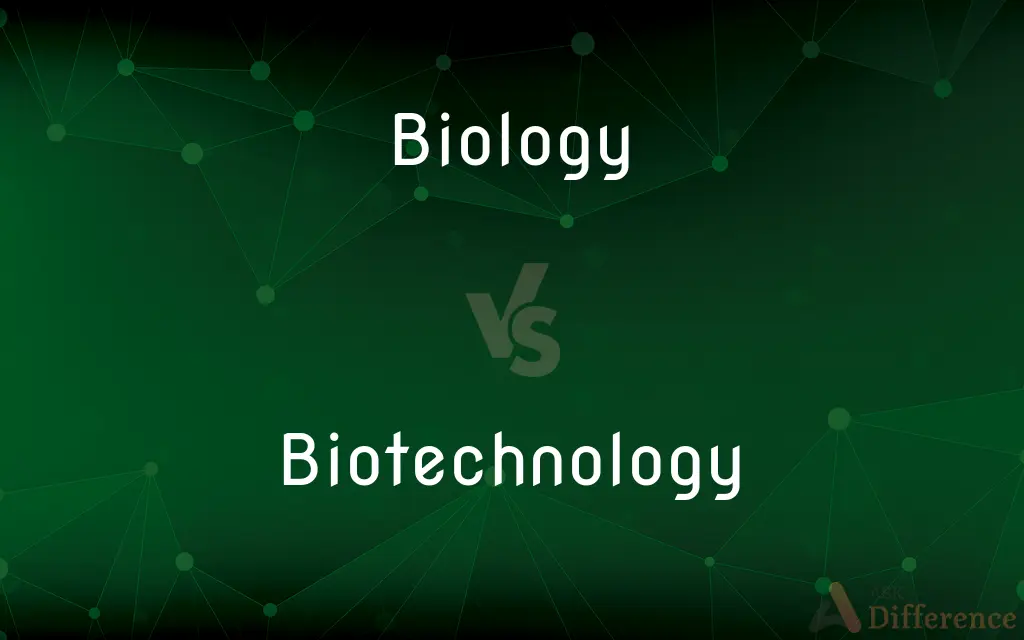Biology and biotechnology represent two captivating realms of science that, while overlapping in certain aspects, fundamentally diverge in their philosophies and applications. Understanding the nuanced distinctions between these fields evokes a curiosity that reflects humanity’s quest for knowledge and control over life itself. As we delve into this topic, we uncover not only the definitions and methodologies characteristic of each discipline but also the ethical implications and future potentials they embody.
Biology, at its core, can be defined as the scientific study of life. It encompasses a vast array of subfields including ecology, zoology, botany, and microbiology, each exploring the intricate complexities of living organisms and their interactions with the environment. The study of biology is inherently observational; it seeks to unravel the secrets of life by examining organisms in their natural habitats. The naturalistic approach of biologists allows for an appreciation of life’s diversity and the inherent connections that bind various forms of life.
On the other hand, biotechnology represents a paradigm shift in the manipulation of biological systems. This discipline intertwines biology with technology, employing scientific insights to engineer solutions for practical applications. Biotechnology harnesses cellular and biomolecular processes to develop products and technologies that benefit society—from pharmaceuticals to biofuels. The engineered nature of biotechnology stands in stark contrast to the organic exploration characteristic of traditional biological study. This deliberate manipulation of living systems raises questions about the boundaries of naturalism and the ethical considerations surrounding such interventions.
One of the most striking differences between biology and biotechnology is the methodology employed within each field. Biologists often embrace empirical research methodologies, conducting experiments and field observations to gather data on living organisms. Their conclusions are built upon a foundational understanding of the natural world, striving to elucidate the underlying principles guiding biological processes. For example, an ecologist might study the interdependent relationships within an ecosystem, meticulously cataloging species and their interactions to grasp the dynamics of biodiversity.
Conversely, biotechnologists adopt a more experimental and engineering-oriented approach. Utilizing tools from molecular biology, genetics, and biochemical engineering, they manipulate biological systems at the cellular level. This might involve techniques such as genetic modification, where specific traits of an organism are altered for purposes such as increased resistance to pests in crops. The focus is on innovation and application, pushing the boundaries of what is possible in life sciences.
The contrast between natural and engineered extends beyond methodology into the realms of ethical considerations and societal implications. The natural affinity for the organic world influences public perception of biological research, often fostering a sense of reverence for ecosystems and biodiversity. Conservation efforts champion the preservation of species and habitats as intrinsic values, rooted in the belief that ecosystems possess inherent worth beyond their utility to humans.
In contrast, biotechnology often grapples with ethical dilemmas surrounding genetic manipulation and the commercialization of biological resources. The advent of genetically modified organisms (GMOs) has sparked passionate debates, pitting the potential benefits against unintended consequences. Critics argue that such interventions disrespect the inherent complexities of natural systems, potentially leading to ecological imbalances. Advocates, however, posit that biotechnology can be harnessed to address pressing global challenges such as food security and disease control.
The potential for biotechnology to revolutionize fields such as medicine and agriculture is profound. Biopharmaceuticals, for instance, have transformed the treatment landscape for chronic illnesses, allowing for tailored therapies that target specific conditions at the molecular level. Developments in tissue engineering and regenerative medicine herald a new era of healing, showcasing biotechnology’s capacity to mend the human body in ways previously deemed fantastical. Such innovations echo a fundamental characteristic of biotechnology: it aspires to enhance and extend life by re-engineering the biological systems of organisms.
Moreover, the implications of biotechnology extend into environmental sciences, as techniques rooted in biotechnology offer pathways for sustainable practices. Bioremediation, the use of microorganisms to decontaminate polluted environments, exemplifies how engineered biological solutions can restore ecological balance. Herein lies a fascinating interplay between the natural world and engineered solutions—a synthesis that could redefine our approach to environmental stewardship.
As we contemplate the dichotomy of biology versus biotechnology, it becomes apparent that both fields possess unique merits and challenges, each drawing from an inexhaustible well of inquiry. The fascination with these disciplines is not solely rooted in their differences, but also in their remarkable convergence; both seek to deepen our understanding of life and its myriad forms. In their respective ways, biology and biotechnology inspire awe and urgency for the future of humanity’s relationship with nature.
Ultimately, the conversation surrounding biology and biotechnology serves as a reflection of a broader societal dialogue—one that interrogates the ethics of technological advancement and the role of humanity as stewards of life. As we advance further into the twenty-first century, navigating the complexities of these fields will necessitate thoughtful discourse, responsible innovation, and a steadfast commitment to uncovering the intricacies of the natural world while innovating for a sustainable future.








